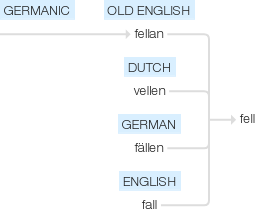Fell
Old English fellan, of Germanic origin; related to Dutch vellen and German fällen, also to fall.
wiktionary
From Middle English fellen, from Old English fellan, fiellan(“to cause to fall, strike down, fell, cut down, throw down, defeat, destroy, kill, tumble, cause to stumble”), from Proto-Germanic *fallijaną(“to fell, to cause to fall”), causative of Proto-Germanic *fallaną(“to fall”), from Proto-Indo-European *peh₃lH-(“to fall”). Cognate with Dutch vellen(“to fell, cut down”), German fällen(“to fell”), Danish fælde(“to fell”), Norwegian felle(“to fell”).
From Middle English fell, fel, vel, from Old English fel, fell(“hide, skin, pelt”), from Proto-Germanic *fellą (compare West Frisian fel, Dutch vel, German Fell), from Proto-Indo-European *pél-no-(“skin, animal hide”) (compare Latin pellis(“skin”), Lithuanian plėnė(“skin”), Russian плена́(plená, “pelt”), Albanian plah(“to cover”), Ancient Greek πέλλᾱς(péllās, “skin”)). Related to film and pell.
From Old Norse fell, fjall(“rock, mountain”), compare Norwegian Bokmål fjell 'mountain', Danish fjeld 'mountain', from Proto-Germanic *felzą, *fel(e)zaz, *falisaz (compare German Felsen 'boulder, cliff', Middle Low German vels 'hill, mountain'), from Proto-Indo-European *pelso; compare Irish aill(“boulder, cliff”), Ancient Greek πέλλα(pélla, “stone”), Pashto پرښه (parṣ̌a, “rock, rocky ledge”), Sanskrit पाषाण(pāşāņá, “stone”). Doublet of fjeld.
From Middle English fel, fell(“strong, fierce, terrible, cruel, angry”), from Old English *fel, *felo, *fæle(“cruel, savage, fierce”) (only in compounds, wælfel(“bloodthirsty”), ealfelo(“evil, baleful”), ælfæle(“very dire”), etc.), from Proto-Germanic *faluz(“wicked, cruel, terrifying”), from Proto-Indo-European *pol-(“to pour, flow, swim, fly”). Cognate with Old Frisian fal(“cruel”), Middle Dutch fel(“wrathful, cruel, bad, base”), German Low German fell(“rash, swift”), Danish fæl(“disgusting, hideous, ghastly, grim”), Middle High German vālant(“imp”). See felon.
Perhaps from Latin fel(“gall, poison, bitterness”), or more probably from the adjective above.
fell
fell
etymonline
fell (v.1)
Old English fællan (Mercian), fyllan (West Saxon) "make fall, cause to fall," also "strike down, demolish, kill," from Proto-Germanic *falljanan "strike down, cause to fall" (source also of Old Frisian falla, Old Saxon fellian, Dutch fellen, Old High German fellen, German fällen, Old Norse fella, Danish fælde), causative of *fallanan (source of Old English feallan; see fall (v.)), showing i-mutation. Related: Felled; feller; felling.
fell (adj.)
"cruel," late 13c., possibly late Old English, perhaps from Old French fel "cruel, fierce, vicious," from Medieval Latin fello "villain" (see felon). Phrase at one fell swoop is from "Macbeth." Related: Fellness.
fell (n.1)
"rocky hill," c. 1300, from Old Norse fiall "mountain," from Proto-Germanic *felzam- "rock" (source also of Old High German felisa, German Fels "stone, rock"), from PIE root *pel(i)s- "rock, cliff." Old High German felisa "a rock" is the source of French falaise (formerly falize) "cliff." Now mostly in place-names, such as Scafell Pike, highest mountain in England.
fell (v.2)
past tense of fall (v.), Old English feoll.
fell (n.2)
"skin or hide of an animal," Old English fel "skin, hide, garment of skin," from Proto-Germanic *fella- (source also of Old Frisian fel, Old Saxon fel, Dutch vel, Old High German fel, German fell, Old Norse fiall, Gothic fill "skin, hide"), from PIE *pel-no-, suffixed form of root *pel- (3) "skin, hide." Related: Fellmonger.
